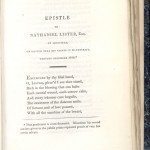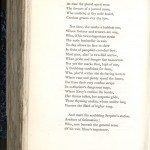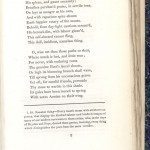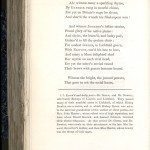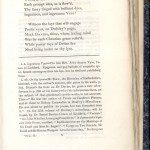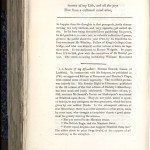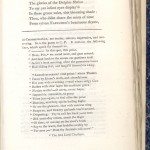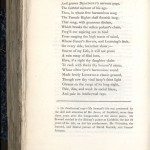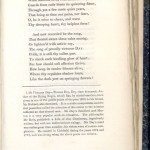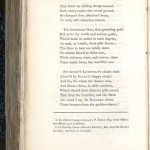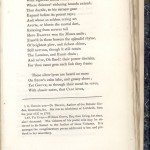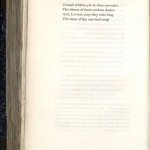Epistle to Nathaniel Lister Esq. of Lichfield by Anna Seward
“[From “”Poetical Works of Anna Seward, Vol 2″”]
[333]
EPISTLE
TO
NATHANIEL LISTER, ESQ.
OF LICHFIELD
ON HAVING READ HIS VERSES IN MANUSCRIPT,
WRITTEN DECEMBER 1786.*
Encircled by thy filial band,
O, Lister, pleas’d I see thee stand,
Rich in the blessing that can balm
Each mental wound, each sorrow calm,
And every irksome care beguile,
The sweetness of the duteous smile.
Of fortune and of love possest,
With all the sunshine of the breast,
*That gentleman is since deceased. Meantime his second son has given to the public prints repeated proofs of very fine poetic talents.
[334]
At ease thy placid spirit woos
The favours of a jocund muse,
Who scatters, at thy mild desire,
Careless graces o’er thy lyre.
Not thee, she marks a luckless son,
Whose fortune and renown are one,
Who, if his twice-important strain
The surely bookseller in vain
To-day allows its face to show
In front of pamphlet-crowded bow,
Must pine, alas! In two-fold sorrow,
When pride and hunger fast to-morrow.
Nor yet she marks thee, high of aim,
A throbbing candidate for fame,
Who, plac’d within the sheltering bowers
Where ease and plenty speed the hours,
Far from their rosy confine strays
In authorism’s dangerous ways,
Where Envy’s restless ills betide,
Her thorns infest, her serpents glide,
Those rhyming snakes, who malice long
Pursues the Bard of higher song.
And mark the scribbling Serpent’s station,
Artificer of defamation!
Who, sore beneath the general sense
Of his vain Muse’s impotence,
[335]
Turns public Critic, to supply
His spleen, and gaunt necessity;
Breathes purchas’d praise, in servile tone,
On lays as meagre as his own,
And with rapacious spite abuses
Each happier votary of the muses.
Behold, from day-light cautious screen’d,
His kennel-dirt, with labour glean’d,
This self-elected censor fling,
This dull, insidious, nameless thing.
O, wise art thou those paths to shun,
Where much is lost, and little won;
For never, with enduring roots
The genuine Poet’s laurel shoots,
Or high its blooming branch shall wave,
Till sprung from his unconscious grave.
Yet oft, for candid friends, persuade
Thy muse to warble in this shade.
Its gales have been inured to spring
With notes Aonian on their wing.
l.10. Nameless thing – Every month teems with strictures on poetry, that display the kindred talents and kindred temper of many of our modern reviewers to those critics, who, in the days of Dryden and Pope, denied them genius, learning, every thing which distinguishes the poet from the mere versifier.
[336]
Ah! witness many a sparkling rhyme,
By GARRICK rung in tuneful chime,
Ere yet on Britain’s stage he shone,
And shar’d the wreath his Shakespear won!
And witness JOHNSON’S loftier strains,
Proud glory of his native plains:
And theirs, the learn’d, and lucky pair,
Ordain’d to fill the prelate chair;
For modest GREEN, in Lichfield grove,
With NEWTON, tun’d his lute to love,
And many a Muse delighted shed
Her myrtle on each rival head,
Ere yet the mitre’s envied round
Their brows with graver honours bound.
Witness the bright, the jocund powers,
That gave to wit the social hours,
l.7. Learn’d and lucky pair – Dr. Green and Dr Newton, afterwards Bishops of Lincoln and Lichfield. They passed many of their youthful years in Lichfield, of which Bishop Newton was a native, and in which Bishop Green was usher to the maternal grandfather of the author of these poems, the Rev. John Hunter; whose school was of high reputation, and from whom David Garrick, and Samuel Johnson, received their classic education. At that period Dr. Green, and Dr. Newton, were rivals in their attachment to the late Mrs Seward, the author’s mother, and then Miss Hunter, whose beauty was the theme of their muse.
[337]
When, as their festal influence glow’d,
Each prompt idea, as it flow’d,
Thy fancy tinged with brilliant dyes,
Ingenious, and ingenuous VYSE!
Witness the lays that still engage
Poetic eyes, on Dodsley’s page,
Meek DAVIES, thine, whose feeling mind
Was by each Christian grace refin’d,
While purest rays of Delian fire
Shed living lustre on thy lyre.
l.4. Ingenuous Vyse – The late Rev. Arch-deacon Vyse, Canon of Lichfield. Epigrams, and gay ballads, of exquisite spirit, flowed extempore from his lips, but he declined publishing them.
l.10. On thy lyre – Mr Shaw, the Historian of Staffordshire, inserted, with the author’s consent, this poem in his work, p. 348. Beneath the lines on Dr. Davies, he gives a note of reference to p. 290 of his history – but his information there, on the subject of that gentleman’s poetic works, is not accurate. Thus – “He was the author of Verses on Camden’s Picture, and of those to Bishop Cornwallis, in Dodsley’s Miscellany. He was about to publish his poems, but was dissuaded from it.” In the fifth volume of Dodsley’s miscellany, will be found, by Dr. Sneyd Davies, Canon of Lichfield, “Vacuna.” “On John Whalley Arranging Pamphlets.” A classic and exquisite little poem, entitled, “Epithalamium on the Marriage of Mr. Dodd and Miss St. Leger.” “Verses on Two Friends, Mr Dodd and Mr Horace Walpole born on the same day.” Nothing can
[338]
Source of my Life, and all the joys
That from a cultured mind arise,
be happier than the thoughts in that panygeric, just characterising two very eminent, and very opposite, yet united spirits. So far from being dissuaded from publishing his poetry, he did publish it, in a now[?] rare, as valuable collection of poems, given to the public about the year 1744, by his friend the before-mentioned Mr Whalley, Fellow of King’s College, Cambridge, and who was himself, as that volume evinces, an ingenious poet. It was dedicated to Horace Walpole. Its pages from 175 to 264, glow with the emanations of Dr. Davies’ genius. The verses on seeing Archbishop Williams’ Monument
l.1. Source of my life – Rev. Thomas Seward, Canon of Lichfield. In conjunction with Mr. Simpson, he published in 1751, an approved Edition of Beaumont and Fletcher’s Plays, with critical notes of much ingenuity. The excellent preface was intirely his. His Female Right to Literature, published in the 2d volume of the first edition of Dodsley’s Miscellany, has been much and justly celebrated. That same volume, p. 302, contains Mr Seward’s Verses on Shakespear’s monument at Stratford-upon-Avon. They do not yield, either in spirit, or beauty, to any panygeric on that great poet, which has been given by our noblest Bards. In the subsequent editions of that Miscellany, there is an idiot alteration in that poem, made by some man, who thought a completer rhyme a good atonement for grossly injuring the sense –
“Nor yet unrival’s the Meonian strain,
“The British Eagle, and the Mantuan Swan
“Tower equal heights – but happier Stratford thou, &c”
The editor chose to print Swan Swain, at the expense of all consistency in the metaphor.
[339]
Thy efforts, liberal as benign,
The glories of the Delphic Shrine
To my yet infant eyes display’d
In these green vales, this blooming shade;
Thou, who didst chace the mists of time
From sylvan FLETCHER’s beauteous rhyme,
in Caernarvonshire, are tender, solemn, impressive, and interesting. So is the poem to C.P. It contains the following lines, which speak for themselves,
“ – At this spot, this point,
Here, Pitt, we social meet, and gaze around,
And look back to the scenes our pastimes trod
In life’s fresh morning, when the gamesome hours
Had sliding feet, and laugh’d themselves away.
Luxurious season! vital prime! where Thames
Flows by Etona’s walls, and cheerful sees
Her sons wide swarming; – and where sedgy Cam
Bathes with slow lapse his academic grove;
Pierian walks! – O never, never hope,
Impossible, untenable, to grasp
Those joys again, to feel alike the pulse
Dancing, and fiery spirits boiling high;
Or see the picture, that with careless wing
Swept on, and flowery garlands toss’d around,
Disporting. Try to call her back; – as soon
Bid yesterday return, arrest the flight
Of time; or musing on the river’s brink
Say to the wave, that huddles swiftly by
For ever; – “from thy fountain roll anew!”
[340]
And graver BEAUMONT’s nervous page,
The faithful mirrour of his age.
Thou, in whose free harmonious song
The Female Rights shall flourish long;
That song, with generous disdain,
Which breaks the sullen pedant’s chain,
Forg’d our aspiring sex to bind
From ranging the high tracts of mind,
Where Fancy’s flowers, and Learning’s fruit,
On every side, luxuriant shoot; –
Source of my Life, it will not prove
A vain essay of filial love,
Here, if a right thy daughter claim
To rank with theirs thy honour’d name,
Whose silver lyre’s harmonious sound
Made lovely LICHFIELD classic ground,
Though now thy vital lamp’s faint light
Gleams on the verge of its long night,
Pale, dim, and weak its social blaze,
And pale its intellectual rays.
l. 20. Intellectual rays – Mr Seward’s life was preserved by the skill and attention of Dr. Jones, of Lichfield, more than after the composition of the above poem. Mr Seward resided in the Bishop’s palace at Lichfield, the last 32 years on his life, as did his predecessor, Mr Walmsley, the learned, and liberal patron of David Garrick, and Samuel Johnson.
[341]
While duteous love, with anxious aim,
Guards from rude blasts its quivering flame,
Through yet a few more quiet years,
That bring to thee nor pains, nor fears,
O, be it mine to cheer, and warm
Thy drooping heart, thy helpless form!
And now recorded be the song,
That floated sweet these vales among,
Or lighten’d with satiric ray,
The song of proudly virtuous DAY.
Pride, it is still thy sullen part
To check each kindling glow of heart;
For how should soft affection thrive,
How keep its tender blooms alive,
Where thy repulsive shadows lours,
Like the dark yew of springing flowers!
l. 10. Virtuous Day – Thomas Day, Esq. since deceased, Author of the Dying Negro, which has, by misinformation, been given one of the public prints of the year 1800, to his friend, Mr Bicknel, also deceased. It is a noble composition, and the first poem that called the attention of this nation to the miseries inflicted on that abused race. Mr Day’s Sanford and Merton is a very popular work on education. The philosophic Mr Keir, published a Life of that Gentleman, ingeniously written, but with too indiscriminate eulogy. Mr Day’s mind was rather great than amiable; his virtues were of a stern complexion. He resided in Lichfield during the years 1771 and 1772, and was living when the above poem was written.
[342]
That sheds its chilling damps around,
And wintry makes the vernal ground.
So changest thou affection’s beam,
To cold, and colourless esteem.
Yet, bounteous Day, that grovelling pride
Did ne’er thy words and actions guide,
Which deals its smiles in each degree,
As rank, or wealth, their gifts decree;
‘Tis thine to look too coldly down
On talents liberal as thine own,
While sickness, want, and sorrow, share
Thine ample boon, thy watchful care.
See favour’d LICHFIELD’s classic train
Adorn’d by ELLIOT’s happy strain!
And his, for whom the Sisters nine,
And Sisters three, in strife combine,
Which should their choicest gifts award,
That form the Courtier, and the Bard.
Ah! need I say ‘tis BOOTHBY claims
These honours from the goddess-dames?
l. 14. Elliot’s happy strain – F.P. Elliot, Esq. then of Stenston-Moss, near Lichfield.
l. 19. Boothby claims – Brooke Boothby, Esq since Sir Brooke Boothby, and then of Lichfield.
[343]
With vigorous mind, whose efforts bend
Where Science’ widening bounds extend,
That ductile, to his earnest gaze
Expand before its potent rays;
And whose so seldom erring art
Averts, or blunts the mortal dart,
Relaxing from severer toil
Here DARWIN won the Muses smile;
Fram’d in these bowers the splendid rhyme,
Of brightest glow, and richest chime,
Still nervous, though it still retain
The Leonine, and Runic chain;
And ne’er, Oh Bard! their power disclaim,
For thou canst gem each link they frame.
These silver lyres are heard no more
On STOW’s calm lake, and grassy shore;
Yet GROVE, as through their mead he roves,
With classic notes, that CLIO loves,
l. 8. Darwin won – Dr Darwin, Author of the Botanic Garden, Zoonomia, &c. He was an inhabitant of Lichfield, from the year 1757 to 1781.
l. 17. Yet Grove – Yet William Grove, Esq. then living, but since, alas! deceased. The richness of his poetic vein may be observed in his Sonnet to the Author of these Volumes. It is amongst the complimentary poems addressed to her, and prefixed to her miscellany.
[344]
Though seldom, yet at times pervades
The silence of these verdant shades
And LISTER, may they echo long
The tones of thy convivial song!



